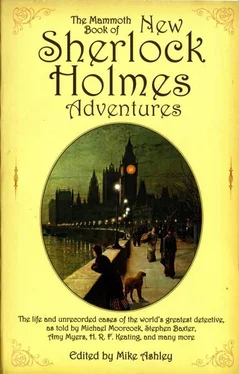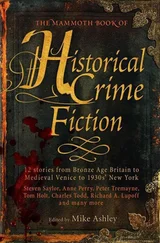Mike Ashley - The Mammoth Book of New Sherlock Holmes Adventures
Здесь есть возможность читать онлайн «Mike Ashley - The Mammoth Book of New Sherlock Holmes Adventures» весь текст электронной книги совершенно бесплатно (целиком полную версию без сокращений). В некоторых случаях можно слушать аудио, скачать через торрент в формате fb2 и присутствует краткое содержание. Жанр: Детектив, на английском языке. Описание произведения, (предисловие) а так же отзывы посетителей доступны на портале библиотеки ЛибКат.
- Название:The Mammoth Book of New Sherlock Holmes Adventures
- Автор:
- Жанр:
- Год:неизвестен
- ISBN:нет данных
- Рейтинг книги:5 / 5. Голосов: 1
-
Избранное:Добавить в избранное
- Отзывы:
-
Ваша оценка:
- 100
- 1
- 2
- 3
- 4
- 5
The Mammoth Book of New Sherlock Holmes Adventures: краткое содержание, описание и аннотация
Предлагаем к чтению аннотацию, описание, краткое содержание или предисловие (зависит от того, что написал сам автор книги «The Mammoth Book of New Sherlock Holmes Adventures»). Если вы не нашли необходимую информацию о книге — напишите в комментариях, мы постараемся отыскать её.
Marianne is an important fictional formulation of Sand's thinking on the role of women and the nature of democracy. This edition includes a long biographical preface which quotes extensively from her correspondences.
The Mammoth Book of New Sherlock Holmes Adventures — читать онлайн бесплатно полную книгу (весь текст) целиком
Ниже представлен текст книги, разбитый по страницам. Система сохранения места последней прочитанной страницы, позволяет с удобством читать онлайн бесплатно книгу «The Mammoth Book of New Sherlock Holmes Adventures», без необходимости каждый раз заново искать на чём Вы остановились. Поставьте закладку, и сможете в любой момент перейти на страницу, на которой закончили чтение.
Интервал:
Закладка:
"This article", I said, "states that the Addleton barrow had been the subject of evil legends as long as anyone can recall. It stood on Addleton Moor, surrounded by many smaller burial mounds. It seems that light falls of snow never covered it and even in the hardest winter the snow always melted on that barrow first. The locals called it the "Black Barrow" because the grass would not grow on it."
"Watson," interrupted Holmes, "the grave on which the snow melts soonest and where the grass will not grow is a
commonplace of rural legend. Half the country churchyards in Britain claim such a grave."
"I know," I said, "but that's not the interesting part. They say here that after Sir Andrew Lewis opened the barrow the village of Addleton was struck by a strange disease. It's symptoms were similar to Sir Andrew's but it was not always fatal. Since then the area has suffered many stillborn children and numbers of deformities. The villagers insist that it resulted from Lewis tampering with the Black Barrow. What do you say to that Holmes?"
He looked thoughtful for a moment. "Sadly, that is not the most reliable of our public prints, but if its report is true then the matter is a singular one. What is your medical opinion, Watson?"
"Perhaps Greedon was right. Maybe Sir Andrew picked up something peculiar during his years in Egypt and passed it on to the people at Addleton. Maybe it's hereditary. Lewis's son died of it. It could be that his father acquired the infection before his son's birth. Perhaps it's one of those unpleasant diseases that can lie dormant for years and then become active."
"Perhaps so," he said. "Watson, be a good fellow and pass me my writing case will you?"
He busied himself with a letter and I believed that the Addleton affair had passed from his mind until he reverted to it at breakfast a couple of days later.
"Do you recall our conversation about the death of Sir Andrew Lewis?" he asked.
"Certainly," I replied.
Holmes lifted a letter from beside his plate. "The press accounts of the affair excited my curiosity," he said, "to the extent that I dropped a line to the County Officer of Health."
"Did you indeed? And what does he have to say?"
Holmes referred to the letter. "While deploring any attempt to suggest that a curse is at work, he confirms that, in the year following Sir Andrew's excavation of the Black Barrow, the village of Addleton suffered a number of deaths from what appeared to be an obscure form of anaemia and a number of stillbirths and deformed births. He suggests that there is no connection between these misfortunes and the archaeological expedition and that the source of the problem may be some effect of the local water supply."
"And what do you believe?" I asked.
"My disbelief in curses is only matched by my disbelief in coincidences. Those who have most occasion to be concerned – the people of Addleton – associate their tragedies with Sir Andrew's excavation. They may be wrong in believing that one is the cause of the other, but that does not mean that there is not a link between the two phenomena. As to the water supply, Addleton stands in a valley surrounded by hills of limestone. In such areas the water is famously pure. One recalls that the villages of south Derbyshire hold ceremonies every summer to celebrate the purity of their limestone streams which, they believe, saved them from the Great Plague."
"And have you any alternative explanation?" I enquired.
"It is far too early for that," he replied. "It would be a serious error to attempt an explanation when we have so little data. Our next effort must be to acquire further information so that the full pattern of these curious events reveals itself."
It was the afternoon of the following day when he enquired, "Have you any engagement this evening, Watson?" When I replied in the negative he said "I thought we might take in this evening's lecture at the Aldridge Institute. Mr Edgar, of Addleton fame, is lecturing on 'The Stones and the Stars', apparently a dissertation on Sir Norman Lockyer's theory that ancient religious monuments were constructed in relation to the movements of heavenly bodies."
The Institute turned out to be in a remote part of south London and Mr Edgar's lecture was not well attended. Nevertheless it was an interesting evening. Edgar was a man of about forty, with the long hair of a scholar and owlish spectacles that imparted a solemn aspect to his face though his lecture revealed a ready wit. His lantern slides, from photographs which he himself had taken, were not only informative but in some cases strikingly attractive. I recall particularly a picture of the great trilithon at Stonehenge lit from behind by the rising sun of midwinter. His arguments in favour of Lockyer's theory, though complex, were lucidly explained for a lay audience and convincing.
As the small audience trickled out at the lecture's end Holmes rose and approached Edgar who was giving some instruction to the lantern operator.
"We have enjoyed your talk," said Holmes,
"Thankyou, gentlemen," said the lecturer, "but I hope you are not journalists."
"Why should you think so?" asked Holmes.
"Because I have received a deal of attention from that profession since the death of Sir Andrew Lewis, and I have nothing to say to the press."
"You may be assured that we are not journalists," said my friend. "I am Sherlock Holmes, and this is my colleague, Dr Watson."
The lecturer's eyes widened behind his round spectacles. "The consulting detective!" he exclaimed, "What, may I ask, is your interest in archaeology?"
"You may have read", said Holmes, "my papers on 'Logical Deductions from Strata' and 'Early English Charters as a Guide to the Keltic Principalities', though they were not published under my own name, but it is not those that bring us here. I would welcome your assistance in my enquiries into the death of Sir Andrew Lewis."
"The death of Sir Andrew!" repeated Edgar. "Surely it is not thought that…"
Holmes raised a hand. "No, Mr Edgar. This is not a matter of murder. Sir Andrew, so far as anyone can tell, died naturally, but the manner of his death bears a strange similarity to the deaths and sicknesses that struck Addleton after the opening of the 'Black Barrow'."
"You believe in the so-called Curse of Addleton, then?" asked Edgar.
"Certainly not," said Holmes, "but I have reliable information that the village has suffered a strange disease since the excavation and it would be in the interest of Addleton's people to determine the cause."
"I know nothing of medicine, Mr Holmes. How can I help you?"
"Simply by telling me what you recall of the excavation at Addleton Moor," said Holmes.
The archaeologist began packing his lantern-slides away in their long wooden cases, while he spoke.
"It was a favourite project of Sir Andrew's," he began. "As a student he had been on Addleton Moor and seen that snow did not lie on the Black Barrow and grass did not grow upon it. He did not, of course, believe in the Curse, but he did believe that there was something unique about that barrow."
"So we went up there, that summer ten years ago, to see what we could find. The weather was fair and Addleton is a pretty village, but I tell you Mr Holmes, before we'd been there long I could have believed in the curse."
"Why was that?" asked Holmes.
Edgar indicated his slides. "One of my functions", he said, "was to take photographs for Sir Andrew. I had no difficulty taking pictures of the Moor, of the other tumuli upon it or anything except the Black Barrow. On the first day I took a group of all the party standing by the barrow. It did not come out. I thought it to be merely a faulty plate, as all my other pictures that day were successful, but, as the excavation progressed, I found that every single plate of the barrow failed."
Читать дальшеИнтервал:
Закладка:
Похожие книги на «The Mammoth Book of New Sherlock Holmes Adventures»
Представляем Вашему вниманию похожие книги на «The Mammoth Book of New Sherlock Holmes Adventures» списком для выбора. Мы отобрали схожую по названию и смыслу литературу в надежде предоставить читателям больше вариантов отыскать новые, интересные, ещё непрочитанные произведения.
Обсуждение, отзывы о книге «The Mammoth Book of New Sherlock Holmes Adventures» и просто собственные мнения читателей. Оставьте ваши комментарии, напишите, что Вы думаете о произведении, его смысле или главных героях. Укажите что конкретно понравилось, а что нет, и почему Вы так считаете.












